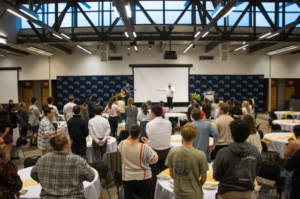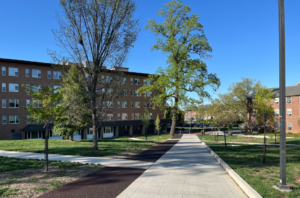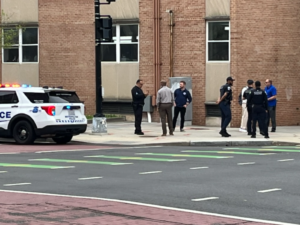The Nuns, the Priests, and the Bombs: Reflection on Nuclear War

Courtesy of IMDB
By Cristina Goerdt
Approximately thirty students gathered in a Shahan Hall classroom to view a film and participate in a discussion with Emmy award-winning filmmaker Helen Young and peace activist Sister Megan Rice. This event took place on the afternoon of Tuesday, January 28 while another screening took place on Wednesday, January 29 in the evening.
Young’s 2017 documentary titled The Nuns, the Priests, and the Bombs details the efforts of several anti-nuclear protestors across the United States, including Rice’s own activism.
The 87-minute film is not Young’s first foray into screenwriting and production. Young spent over 25 years working in broadcast journalism including “The CBS Evening News with Dan Rather” and “Dateline NBC.” During her time at CBS, Young covered stories such as the death of Princess Diana and the trial of O.J. Simpson. Her investigative work was recognized with one National Emmy award and three New York Emmy Awards.
Maryanne Cusimano Love, who hosted the event, said in an interview on Tuesday that Catholic University is uniquely poised to consider the ethics of nuclear war due to its location at the “intersection of church and state.”
Love added that events such as these not only align with the Catholic Church’s general teaching on nuclear war, but also with Pope Francis’ recent refocus on the humanitarian and environmental dangers of nuclear war. She pointed to his recent visits to Hiroshima and Nagasaki, Japan, as well as the Holy See’s key role in nuclear arms reduction talks as evidence of the Church’s continued determination to eradicate nuclear warheads.
Young explained that she had been interested in exploring nuclear war for years due to her background in international affairs. The motivation for this project arose when she read a Wall Street Journal op-ed published in 2013 written by former Secretary of Defense George Schultz, former Secretary of State Henry Kissinger, former Senator Sam Nunn, and former Secretary of Defense William Perry. In the article, the former officials question the efficacy of deterrence and call for new non-proliferation efforts.
It was then, Young said, that she began to question what had changed since the bombings of Hiroshima and Nagasaki. Why had such pro-deterrence, Cold War-era officials changed their minds?
In 2012, Rice and two other peaceful protestors, Michael Walli and Greogry Boertje-Obed, trespassed onto the Y-12 National Security Complex in Tennessee. According to a government website, Y-12 houses the nation’s “stockpile of highly enriched uranium” used for making nuclear weapons and was at one time thought to be the most secure facility in the world.
However, after clipping mere fences, Rice and her accomplices simply approached the Highly-Enriched Uranium Manufacturing Facility and painted slogans such as “Woe to the empire of blood” and “the fruit of justice is peace.” They even splashed human blood on the walls.
Rice, Walli, and Boertje-Obed were arrested and convicted of sabotage. Rice, who was 82 at the time of her imprisonment, was sentenced to three years. In 2015, an appellate court ruled that the sentencing was too severe and ordered all three activists to be set free immediately.
Rice is a Roman Catholic nun of the Society of the Holy Child Jesus and spent most of her adult life teaching biology in Africa. Upon her return to the U.S., Rice became interested in nuclear activism when she heard about the efforts of the Plowshares movement in Tacoma, Washington.
As explained in the film, Plowshares is a loosely organized, largely Christian national movement that began in the 1980’s that peacefully protests the abolition of nuclear weapons. Their namesake stems from Isaiah 2:4, which reads: “they shall beat their swords into plowshares.”
According to the film, Rice’s own excursions into government nuclear facilities were inspired by the actions taken by Plowshares members in Tacoma, where two priests, a nun, and two other women broke into Naval Base Kitsap-Bangor, where eight nuclear submarines (SSBNs) were docked. After hearing of their arrest and conviction, Rice felt compelled to act similarly.
During the question and answer period, students solemnly asked questions about obtaining more education regarding the topic and how to become involved. Young asserted that change is needed now, claiming that the two “existential threats” facing the world today are climate change and nuclear war. Nuclear war is a “blind spot” for many young people, Rice and Young concluded.
However, both Young and Rice noted that the interest in events such as film screenings and protests give them “hope for the future” of peaceful activism.
Senior politics major Samantha Hakeem said that while she was anti-nuclear weapons before the screening, she was “inspired” to learn more about the issue and is interested in taking action herself.








